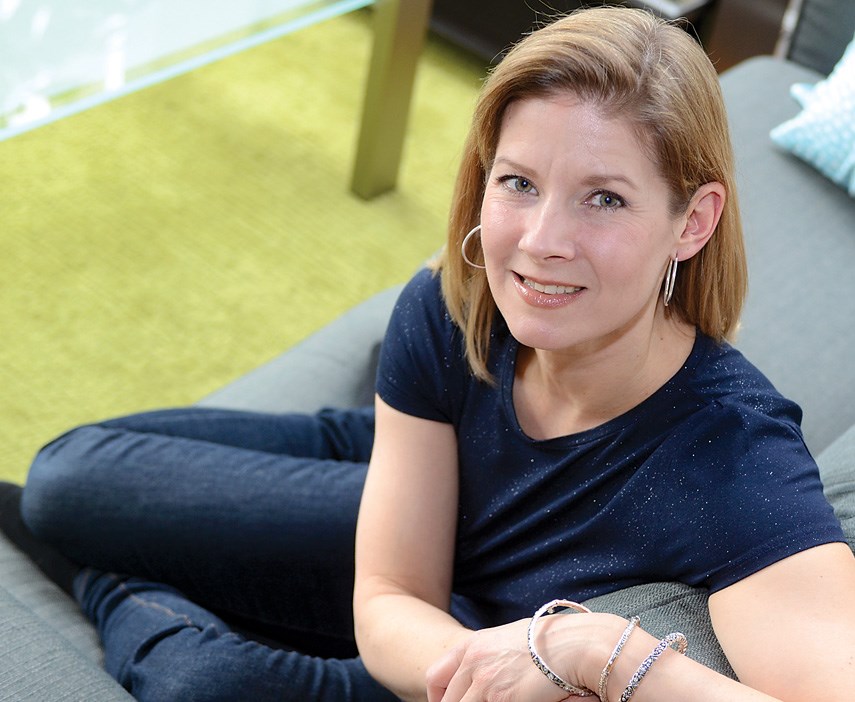Her business was growing bigger and bigger, but behind the veneer she was feeling smaller and smaller.
North Vancouver resident Claire Booth, a market research executive, entrepreneur and self-proclaimed burnout survivor, says the extent of her inner critic started to show itself more and more four years ago, when all signs in her life were pointing towards success but she was “just so miserable.”
“I had to work hard to hide that from my team,” Booth tells the North Shore News.
She’s hiding it no longer. Booth recently published her first book, The Achiever Fever Cure, which aims to rid people of the “delusional sense” that achieving one’s next big goal will be the end-all that finally makes them a happy, whole person.
“It’s that whole thing about, ‘I’ll feel better when … I’ll be happy when …’ and we tie our happiness and fulfilment to our achievements,” explains Booth, who has lived on the North Shore for the last 20 years.
Subtitled How I Learned To Stop Striving Myself Crazy, Booth says that for years she suffered relentlessly from “achiever fever,” which she describes as tying one’s self-worth to their accomplishments even when they don’t necessarily lead to any increase in happiness.
“For me, it manifested most vividly through insomnia. I would lie awake at night and not be able to turn my thoughts off. My thoughts would start with the to-do list that I had to accomplish for the next couple of days, and then I’d start worrying about whether or not I could get those things accomplished,” says Booth. “And then the self-doubt would kick in and then I’d just downward spiral into this hamster wheel of non-stop thoughts.”
“Achiever fever” is an ailment many people can relate to, Booth learned, following conversations with everyone from friends, co-workers, clients and strangers. “That’s when I realized this was bigger than me,” she says. “There’s a lot of people walking around beating themselves up.”
These days, Booth still strives to achieve high – whether it’s professionally with her company, the North Vancouver-based Lux Insights, or when hitting the swimming pool, or with regards to any of her other interests and projects – but she’s keeping the fever at bay.
“It’s something you have to practice every day,” she says. “If you want to lose weight you know you have to move your body and you know that you have to watch what you eat – it’s the same thing with ‘achiever fever.’ If you want to keep it at bay, if you want to cure it, it means that there are practices that you need to incorporate into your life on a regular basis.”
Charting her own personal story, Booth recommends a number of methods for managing ‘achiever fever,’ including self-inquiry, meditation and consciously revaluating what brings a person joy.
“One of the first key things that I learned how to do was get to know that voice in my head, that critical, nagging, incessantly mean inner critic,” she says, adding that through self-inquiry she was – and still is – able to ask herself clear questions which help in weeding out the stressful thoughts. “Asking ourselves: ‘Is that true? Is that thought true?’ The answer is usually no.”
Perhaps most importantly, Booth now focuses on things that bring her joy and connectedness, not mere achievement, to find her own happiness and sense of self-worth.
“That’s not to say that we end up sitting on a beach and doing nothing, it’s actually the opposite – once we start acting and making decisions from a place of connection with ourselves and a connection with others, we are capable of doing so much more than we ever could have imagined,” she says.
Setting out to write her book was extremely therapeutic, Booth notes. She says she initially assumed it would mainly be read by other professionals in high-stress jobs, but found its message has resonated with a wide swath of people, drawn to the idea that in these high-stress, fast-paced times there’s more to life than just the material achievements one’s able to produce.
Though, she notes, her book isn’t a tirade against the notion of achieving and setting high goals, whether personally or professionally, in general – it’s just a matter of perspective.
“There’s nothing wrong with working hard. It’s when we tie our happiness and our self-worth to those achievements that we get into trouble,” she says.
“Until we start to question these stressful thoughts, we keep living lives full of self-doubt.”



